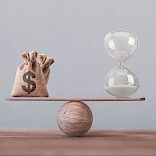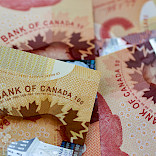It is true that when we are completely in the dark, as is, in my opinion, the case currently on the economic front, the investor finds themselves unable to make decisions. This may be the lesser evil, because I believe that the worst thing to do in a time of high uncertainty would be to sell one’s stock market investments.
I would add, however, that when we are immersed in a period of heightened uncertainty, most of us also have the unfortunate tendency to anticipate the worst-case scenario.
Let us take the current example of the tariffs the American administration is considering imposing on imports from many countries. I believe it is particularly difficult, if not impossible, to know what will happen in the coming weeks and months. The President of the United States recently granted a 90-day reprieve on the substantial tariffs he had announced at the beginning of April, but who can say what will happen between now and then—or in 90 days?
Yet, it is the worst-case scenario—prohibitive tariffs targeting most countries—that is capturing the attention of many observers. From this scenario, we extrapolate by predicting a global recession, higher and more persistent inflation and interest rates, as well as a sharp correction in stock markets.
With such a scenario in mind, many investors may be tempted to exit the stock markets or, at the very least, to wait before reinvesting their cash.
However, although the most pessimistic scenario is a real possibility, it is, in my opinion, unlikely. It is just as likely that the American administration will completely change course over the coming months by eliminating or substantially reducing the tariffs.
The investor is prey to numerous psychological biases that negatively influence their behavior in the stock market. It is difficult to counter these biases, but becoming aware of them is a big step toward success. In the current situation, I think of at least two of these biases:
First, most of us tend to extrapolate from recent events. Regarding the tariffs imposed by the United States, it is difficult for us to anticipate a sudden reversal in the direction of the American administration. In his book Factfulness, Hans Rosling calls this bias “the straight-line instinct.” But things do not always move in a straight line—reversals happen regularly in life!
Second, many of us tend to be pessimistic rather than realistic. This is Hans Rosling’s “negativity instinct.” I admit that the media does not help by reveling in bad news, which captures readers’ attention far more effectively.
The best opportunities generally arise when uncertainty is at its peak. Now, uncertainty may not be at its absolute height, but we are closer to it today than we have been in recent years.
Philippe Le Blanc, CFA, MBA
Chief Investment Officer at COTE 100
_______






